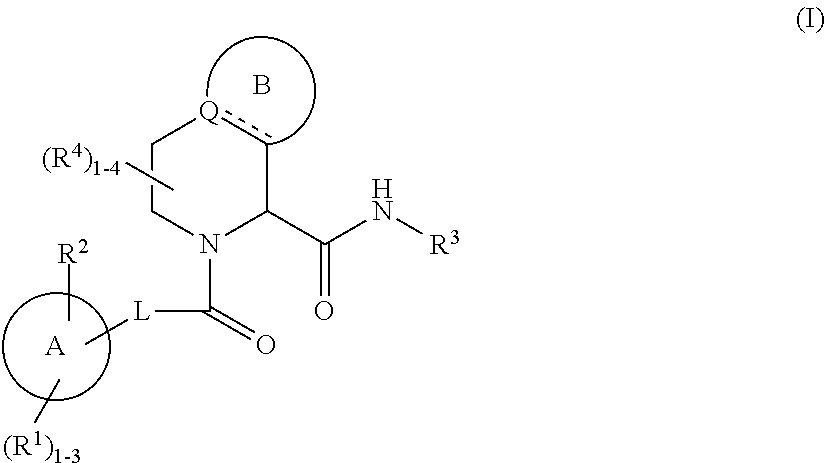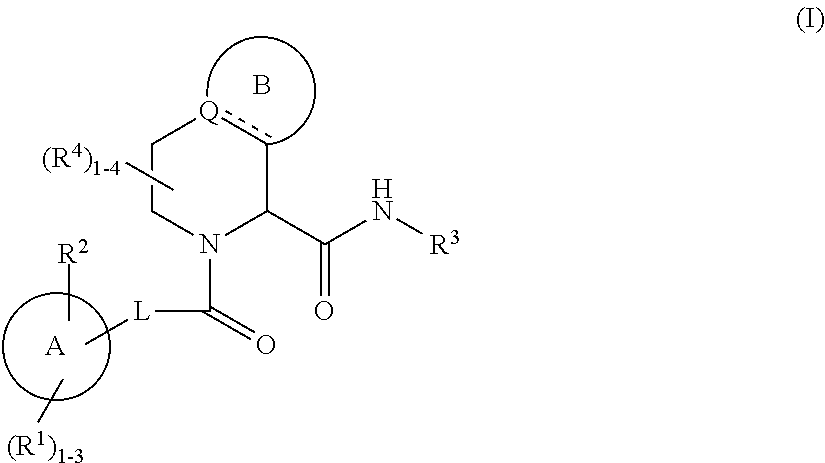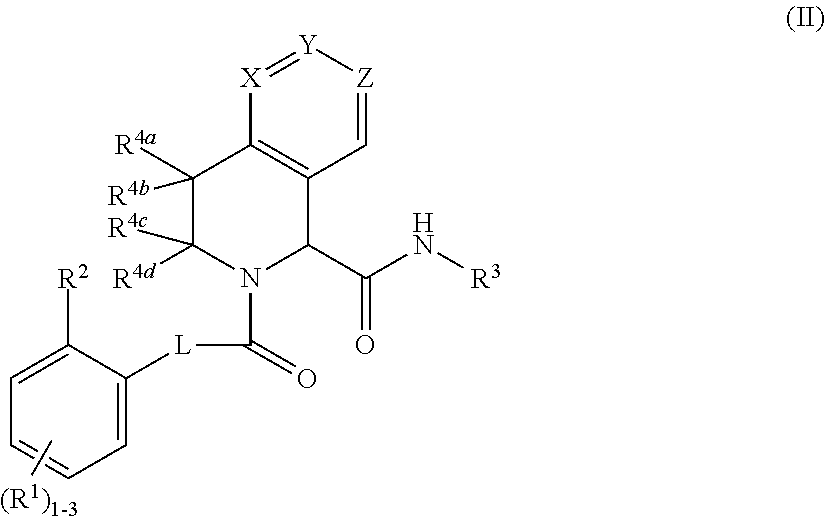Substituted tetrahydroisoquinoline compounds as factor xia inhibitors
a technology of substituting tetrahydroisoquinoline and factor xia inhibitor, which is applied in the field of new products, can solve the problems of limited use of thq compounds
- Summary
- Abstract
- Description
- Claims
- Application Information
AI Technical Summary
Benefits of technology
Problems solved by technology
Method used
Image
Examples
example 1
(S,E)-4-(2-(3-(5-chloro-2-(1H-tetrazol-1-yl)phenyl)acryloyl)-1,2,3,4-tetrahydroisoquinoline-3-carboxamido)benzoic acid
[0509]
[0510]1A. (S)-Benzyl 3-(4-(tert-butoxycarbonyl)phenylcarbamoyl)-3,4-dihydroisoquinoline-2(1H)-carboxylate: To (S)-2-(benzyloxycarbonyl)-1,2,3,4-tetrahydroisoquinoline-3-carboxylic acid (0.161 g, 0.517 mmol) and tert-butyl 4-aminobenzoate (0.1 g, 0.517 mmol) in pyridine (2 ml), cooled to 0° C., was added POCl3 (0.048 ml, 0.517 mmol). After 1 h, the reaction was partitioned with H2O (15 mL) and EtOAc (40 mL). The organic layer was washed with 0.1 N HCl (10 mL), brine (10 mL) and dried (MgSO4). Purified by normal phase chromatography to afford 0.247 g of desired product as brown film. MS (ESI) m / z: 487.4 (M+H)+.
[0511]1B. (S)-tert-Butyl 4-(1,2,3,4-tetrahydroisoquinoline-3-carboxamido)benzoate: 1A (0.247 g, 0.508 mmol) was hydrogenated at 50 psi for 1 h in EtOH (25 ml) with 10% Pd / C (35 mg). Filtered through Celite® and concentrated to give 0.134 g of desired produc...
example 2
(R,E)-4-(2-(3-(5-chloro-2-(1H-tetrazol-1-yl)phenyl)acryloyl)-1,2,3,4-tetrahydro isoquinoline-3-carboxamido)benzoic acid
[0514]
[0515]Example 2 was made in a similar manner as Example 1 starting with (R)-2-(benzyloxycarbonyl)-1,2,3,4-tetrahydroisoquinoline-3-carboxylic acid. 1H NMR (400 MHz, MeOD) δ 9.55 (1H, s), 8.29 (1H, d, J=2.27 Hz), 7.95 (2H, d, J=8.59 Hz), 7.70 (1H, dd, J=8.59, 2.27 Hz), 7.54-7.66 (3H, m), 7.44 (1H, d, J=15.41 Hz), 7.34-7.39 (1H, m), 7.27-7.31 (3H, m), 7.21 (1H, d, J=15.66 Hz), 5.01-5.10 (2H, m), 4.88-4.95 (2H, m), 3.24-3.32 (1H, m) ppm. MS (ESI) m / z: 529.0 (M+H)+. Analytical HPLC: RT=7.5 min.
example 3
(S,E)-4-(2-(3-(5-chloro-2-(1H-tetrazol-1-yl)phenyl)acryloyl)-1,2,3,4-tetrahydroisoquinoline-1-carboxamido)benzoic acid
[0516]
[0517]3A: (S)-(9H-fluoren-9-yl)methyl 1-(4-(tert-butoxycarbonyl)phenyl carbamoyl)-3,4-dihydroisoquinoline-2(1H)-carboxylate: To (S)-2-(((9H-fluoren-9-yl)methoxy)carbonyl)-1,2,3,4-tetrahydroisoquinoline-1-carboxylic acid (0.358 g, 0.896 mmol) and tert-butyl 4-aminobenzoate (0.191 g, 0.986 mmol) in pyridine (2 mL) / DCM (5 mL), cooled to 0° C., was added POCl3 (0.048 ml, 0.517 mmol). After 1 h, the reaction was partitioned with H2O (15 mL) and EtOAc (40 mL). The organic layer was washed with 0.1 N HCl (10 mL), brine (10 mL) and dried (MgSO4). Collected 0.64 g of desired product as white foam. MS (ESI) m / z: 575.4 (M+H)+.
[0518]3B: (S)-tert-Butyl 4-(1,2,3,4-tetrahydroisoquinoline-1-carboxamido)benzoate: To 3A (0.64 g, 1.11 mmol) was added morpholine (0.3 mL) and DMF (4 mL). After 30 min, the reaction was partitioned with H2O (10 mL) and EtOAc (20 mL). The organic laye...
PUM
| Property | Measurement | Unit |
|---|---|---|
| pH | aaaaa | aaaaa |
| stereoisomer | aaaaa | aaaaa |
| molecular weight | aaaaa | aaaaa |
Abstract
Description
Claims
Application Information
 Login to View More
Login to View More - R&D
- Intellectual Property
- Life Sciences
- Materials
- Tech Scout
- Unparalleled Data Quality
- Higher Quality Content
- 60% Fewer Hallucinations
Browse by: Latest US Patents, China's latest patents, Technical Efficacy Thesaurus, Application Domain, Technology Topic, Popular Technical Reports.
© 2025 PatSnap. All rights reserved.Legal|Privacy policy|Modern Slavery Act Transparency Statement|Sitemap|About US| Contact US: help@patsnap.com



